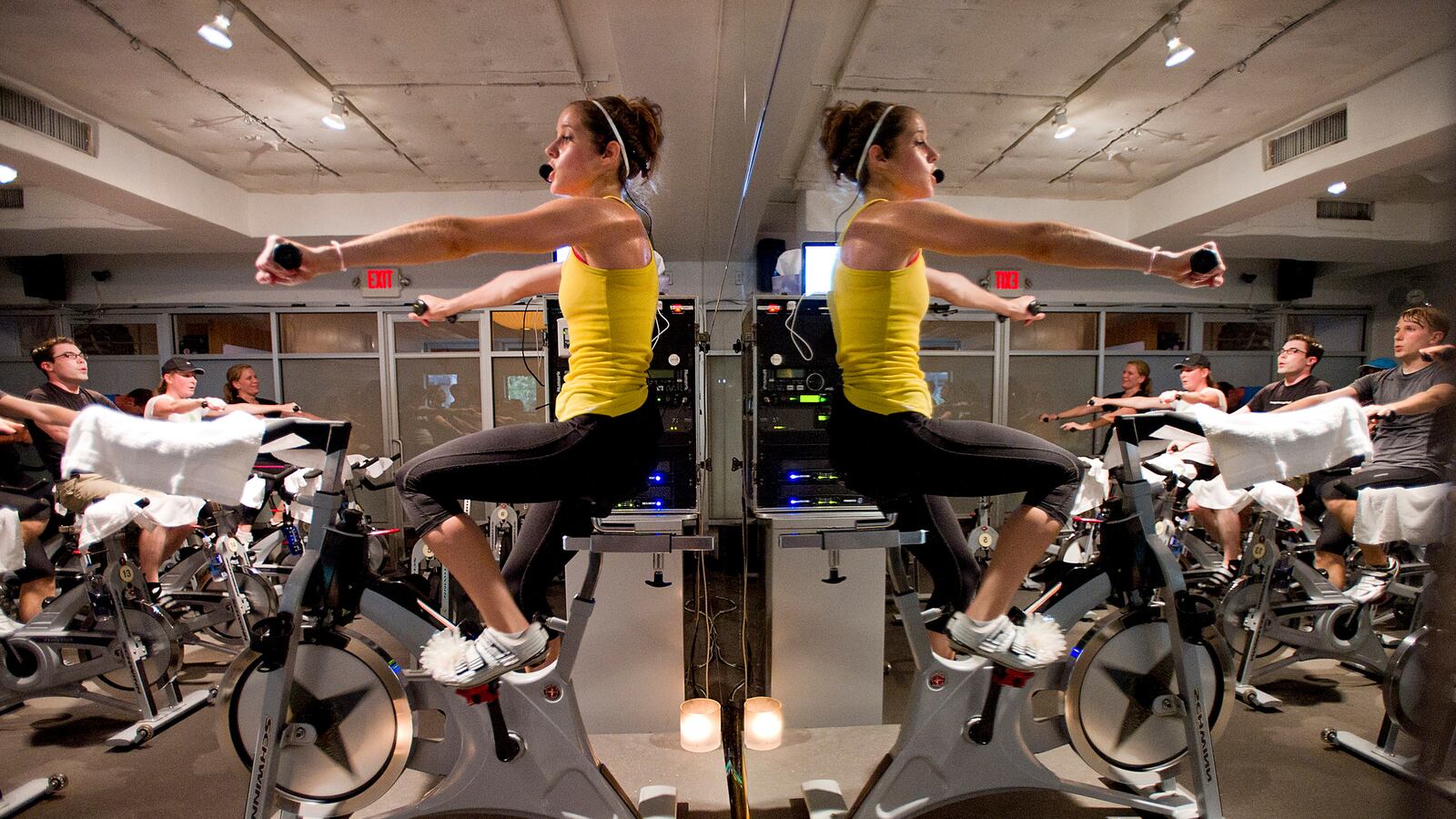In this economy, you’d rather be Tiffany, the Ritz-Carlton, or Neiman Marcus than Zales, Ramada, or Walmart. We live in a new gilded age in which 1 percent of the population has 40 percent of all wealth and controls a large chunk of discretionary spending. As a result, we’ve seen a raftload of new businesses that cater to the upper crust, from jet-leasing companies to summer camp concierges and sleep coaches.

The world of fitness is no exception. Wealthy people on the coasts have long hired personal trainers to keep their bodies taut. But SoulCycle, the indoor cycling chain founded in New York in 2006 where 45-minute classes cost up to $40, is making a big business out of putting wealthy rear-ends onto stationary bikes. SoulCycle, which has gained cultlike followings in New York City, California, and the Hamptons, plans to have 50 to 60 studios nationwide and in London by the end of 2015. By peddling merchandise and aligning with other high-end brands, it is also evolving into a broader business. “The brand is scaling,” said Gabby Cohen, the public-relations and marketing director at SoulCycle.
SoulCycle is emphatically not a gym or a health club. Most fitness providers, like Crunch, Crossfit, and Planet Fitness, offer unlimited access for a monthly or yearly fee or a tiered version of that model in which more expensive subscriptions give access to more locations. Luxury fitness giant Equinox, which acquired SoulCycle in 2011, runs on the same model. You pay an initiation fee and a monthly rate in exchange for unlimited use at facilities.
SoulCycle, founded in 2006 by Julie Rice and Elizabeth Cutler, is more exclusive. Registration takes place online each Monday on a class-by-class basis. Though such a model has more logistical complications than Equinox’s unlimited flat-fee approach, the combination of high prices and the need to make reservations make SoulCycle classes a sought-after product that is always in limited supply.
Competitors that run on similar models are aimed at the same affluent demographic as SoulCycle. Barry’s Bootcamp, which has outposts in New York, California, Nashville, London, and Norway, sports a per-class price point almost identical to SoulCycle’s and a celebrity following.
In a typical class, which lasts around 45 minutes, participants are guided through high-resistance “climbs”; lower-resistance “sprints”; an arm workout with 1-, 2-, 3-, or 5-pound hand weights; and choreographed exercises on the bikes like pushups on the handlebars; classes conclude with a stretch. The vibe of the chain has been described as “yoga-flavored” with parts of classes conducted by candlelight. The Upper East Side location also boasts a black light and disco ball. Inspiring words like “LEGEND,” “ATHLETE,” and “ROCK STAR” are plastered on the walls.
SoulCycle doesn’t disclose much about its finances. But the economics of this model are clearly pretty favorable. At the Upper East Side location, the larger of two studios has 71 bikes; the smaller has 46. With classes priced at $34 a pop in New York City, that means a sold-out class can bring in almost $2,500 in less than an hour, or about $1,500 in the smaller studio. And that’s not counting $3 shoe rentals or sales of $2 SmartWaters at the front desk. At the Bridgehampton location, a sold-out class in the 72-bike studio with $40 per-class price tag pulls in almost $3,000. Locations with two studios (only the Upper East Side and Tribeca, for now) can also run multiple classes at once.
SoulCycle is able to charge a premium because of the talent and skill of its star instructors like Stacey Griffith and Rique Uresti, whose classes often sell out in minutes. It doesn’t hurt that studios have been planted in the fertile soil of high-income ZIP codes: Soul Roslyn, Soul Water Mill, Soul Marin, Soul Brentwood.
Naturally, there’s a sort of club within the nonclub. The affluence of the typical customer and loyal followings cultivated by particular instructors allows SoulCycle to sell 50-class SuperSoul packages priced at $3,500, which comes out to $70 a class. Buying these packages is kind of like flying first class. Sure, you pay twice as much as other customers. But the higher price affords early registration for classes, a concierge service, and priority on wait lists. If there’s anything today’s one percent consumer hates, it’s waiting on a line.
Although instructors seem to comprise the lifeblood of the company, SoulCycle is currently facing a class-action lawsuit led by former instructor Nick Oram, who faults SoulCycle with compensating instructors only for their time teaching classes, not for training and other work outside the studio. SoulCycle has defended its compensation as in full compliance with the law. New York magazine reported earlier this year that novice instructors can make up to $125 to $150 for a sold-out class, with a typical starting load of 8 classes per week; they also receive health insurance and agree not to teach spinning elsewhere.
At SoulCycle, selling the expensive labor of star instructors is just the beginning. The company has established partnerships with established luxury-goods manufacturers. The buildings are scented with candles from high-end home furnishings brand Jonathan Adler. A wide range of merchandise, from iPhone cases to beach towels to Lululemon athletic apparel branded with SoulCycle designs, is available for purchase.
SoulCycle is clearly booming. Earlier this month The New York Times reported that the company’s payrolls have grown to over 700 employees and that it recently opened new corporate offices in Lower Manhattan as part of what Cutler termed the transition “from a fitness studio into a lifestyle brand.” The acquisition by Equinox was instrumental in SoulCycle’s national expansion plans. And the website promises new openings in Beverly Hills, San Francisco, and Westchester. Equinox acted in a similar role on a smaller scale with Hong Kong–based Pure Yoga, which opened spaces in New York in 2007. However, unlike SoulCycle, Pure Yoga runs on a monthly membership model, and it is unclear how SoulCycle plans to recruit and maintain quality-controlled instructors as it expands, a bigger problem in a fee-per-class model. In the past, SoulCycle has relocated established instructors to new locations, but such a strategy seems less tenable as the brand strives toward opening dozens of new studios.
Like any successful luxury brand, SoulCycle seems to have been built with a very deliberate eye toward choosing merchandise and instructors that add to an established air of quality and freshness, one that is clubby without being cliquey. As Cohen noted, SoulCycle is “really committed to customer service and to making sure we deliver the product 100 percent of the time, the best product regardless of the scale.”
The challenge for SoulCycle is the same one that many high-end retail concepts have faced. There are plenty of rich people in the U.S. But once you get away from the coasts (with the exception of Denver, Atlanta, and Houston), it’s hard to find that many places that are home to intense, large concentrations of high-end consumers. Sure, one could imagine Soul Buckhead or Soul Cherry Creek prospering. But Soul Winnetka? Soul Cincinnati? And even if such locations can thrive, they might not be able to do so while also leaving the brand’s East Hampton cachet untouched.






